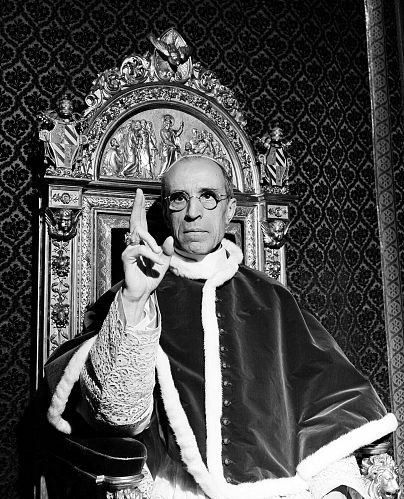More than 150 historians and researchers have signed up to access the soon-to-open Vatican archives of the World War II-era pope.
He was coined as "Hitler's Pope" by some but considered a saint by others.
For decades, World War II-era Pope Pius XII has been the focus of intense controversy for his record during the Holocaust.
On March 2, the Vatican will open Pius XII's archives. The initiative has drawn overwhelming interest from historians and researchers, with more than 150 already registered to access the apostolic library.
Cardinal Jose Tolentino Calaca de Mendonca, the Vatican's chief librarian, said Thursday that all researchers "regardless of nationality, faith and ideology" were welcome to request access.
"The church has no reason to fear history,'' he told reporters.
Can the transparency initiative shed light on Pius XII's troubled papacy? Euronews takes a look.
Why is the Vatican opening Pius XII archive?
It usually takes 70 years after the end of a papacy for archives to become available.
But Emeritus Pope Benedict XVI, a great defender of Pius, accelerated the process to open the archives ahead of schedule so that researchers could have their say. Pope Francis announced the archive would be ready on March 2.
Controversy might have something to do with the early opening.
Some Jewish groups and historians have accused Pius, who was pope from 1939-1958, of staying silent during the Holocaust and not doing enough to save lives.
According to Alan Avery-Peck, a Professor in Judaic Studies at the College of the Holy Cross, "there is strong evidence that Pius XII knew of the Nazis’ 'Final Solution' – their intention to annihilate the Jews."
"Information came to him from various sources. For example, the Polish ambassador to the Vatican brought the pope updates and entreaties for action," the expert wrote.
"Additionally, the World Jewish Congress begged the pope openly to proclaim his revulsion for Nazism. Even the US informed the Vatican in September 1942 that residents of the Warsaw Ghetto were being slaughtered."
Pius' silence is believed to have been motivated by his aversion to communism.
"One of the most widely believed arguments about Pius and his alleged silence is that he viewed Communism as the greatest threat to Christian Europe and therefore saw Germany as a bulwark against the expansion of Soviet Communism," wrote historian José M. Sanchez in a 2002 publication on the subject.
But Pius' defenders at the Vatican and beyond say he worked behind the scenes to combat the Nazis and encouraged convents and other religious institutes to hide Jews.
"The most defensible reason for Pope Pius’ behaviour is the best-documented: that is, that he believed that a strong, direct protest against Nazi terrorism would simply make things worse for the persecuted people," Sanchez wrote.
Moreover, the archives stored at the Vatican cover a period from March 2, 1939 to October 9, 1958, which is the second longest pontificate of the 20th century after that of Jean Paul II.
This highly anticipated event, therefore, coincides with the 81st anniversary of the election of Cardinal Eugenio Pacelli.
What can we expect to learn from the archive?
David Kertzer of Brown University is among the historians who will access the archives from Day 1 of the opening.
He told AP news agency that the light it will shed on the role played by the pope during the war ''had generated tremendous excitement in the scholarly world, and beyond.''
But officials warned that the process of studying the millions of pages of documents from six different archives will be measured in years, not days, weeks or months, and will require patience.
"It is unthinkable for a researcher to come to the archives and either look for an easy scoop in a short time or write a book in just one year," stressed Monsignor Sergio Pagano, the prefect of the archive. ``"We will need several years."
How many resources are at the disposal of the researchers?
1.3 million digital documents interfaced with an inventory are available to researchers, including official documents but also writings, memoirs and personal journals of members of the diplomatic services of the Holy See.
This represents 16 million sheets, 15,000 envelopes and 2,500 booklets.
The bunker in which the archives are stored includes 85 kilometres of shelves. But searchers are able to consult them also via the consultation room.
Vatican's Secretary for Relations with States, Mgr. Paul Richard Gallagher, told Vatican News that the digitalisation at such a big scale will help researchers to "no longer waste time waiting and research is free at 360 degrees."
"The speed of research and consultation will probably also be greatly appreciated", he added.
What does it mean for Pius XII's potential beatification?
Jewish groups and historians have argued for years that the Vatican had no business moving forward with Pius' beatification cause until the Vatican's full archives were opened. They have also asked that any beatification be put off until the generation of Holocaust survivors have died.
Benedict moved Pius one step closer to possible sainthood in December 2009, when he confirmed that Pius lived a life of "heroic Christian virtue." All that is needed now is for the Vatican to determine a ''miracle'' occurred.
Pope Francis said in 2014 that the miracle hadn't been identified, suggesting that the process would remain on hold, at least for now.












